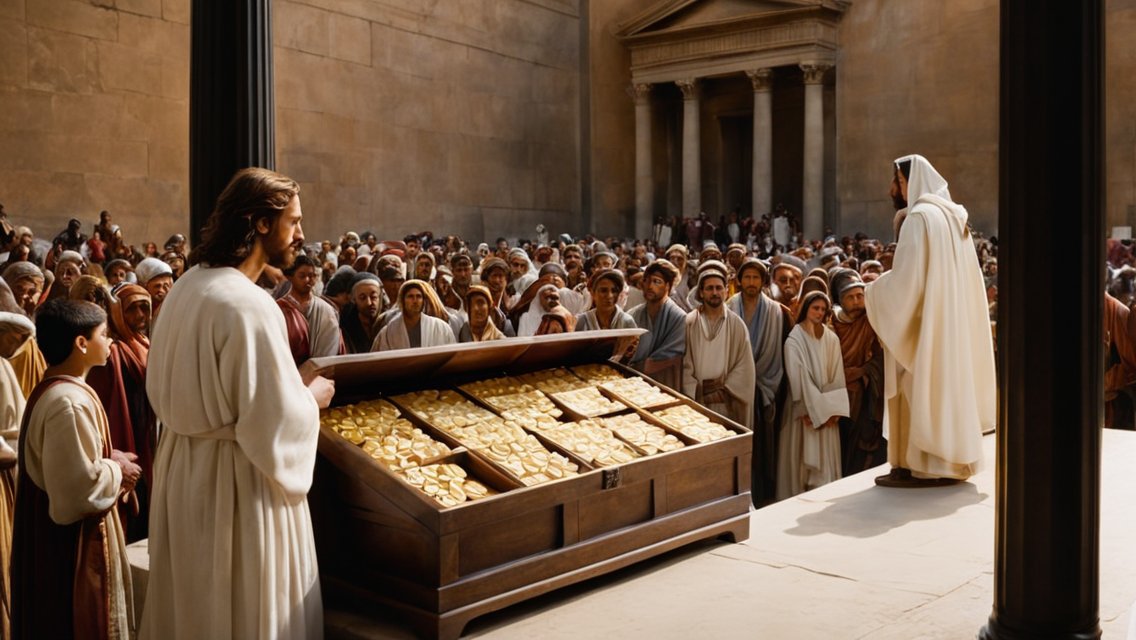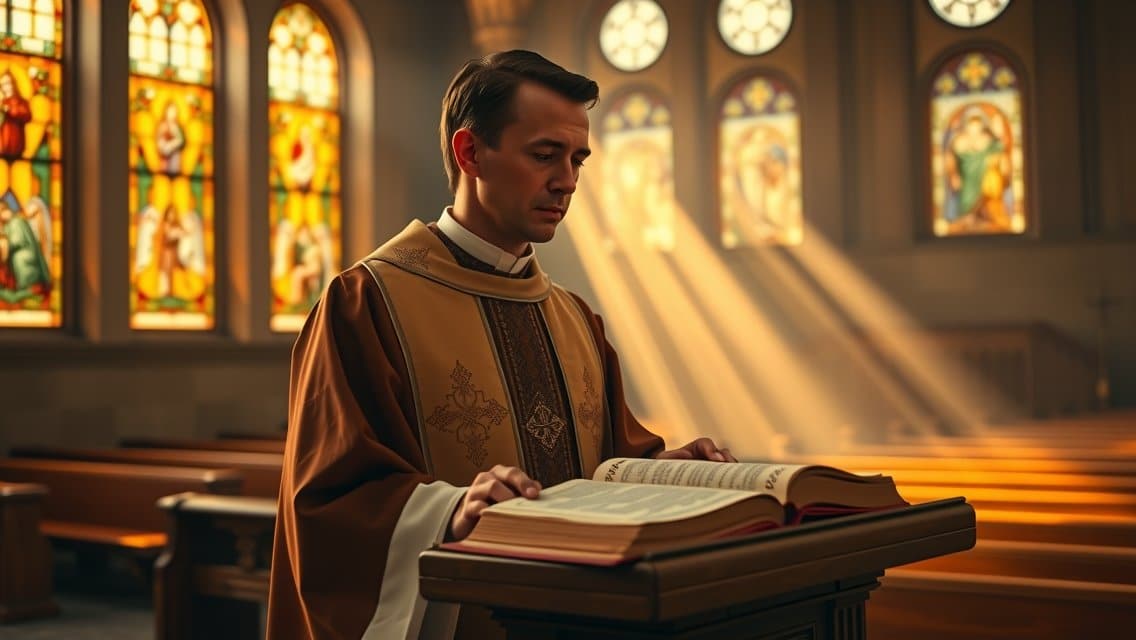Homily For 32nd Sunday in Ordinary Time Year B
Readings:
1 Kgs 17:10-16
Heb 9:24-28
Mk 12:38-44 (or 44-44)
Mass Readings for Homily For 32nd Sunday in the Ordinary Time Year B
1st Reading – 1 Kings 17:10-16
10 In those days, Elijah the prophet went to Zarephath. As he arrived at the entrance of the city, a widow was gathering sticks there; he called out to her, “Please bring me a small cupful of water to drink.”
11 She left to get it, and he called out after her, “Please bring along a bit of bread.”
12 She answered, “As the LORD, your God, lives, I have nothing baked; there is only a handful of flour in my jar and a little oil in my jug. Just now I was collecting a couple of sticks, to go in and prepare something for myself and my son; when we have eaten it, we shall die.”
13 Elijah said to her, “Do not be afraid. Go and do as you propose. But first make me a little cake and bring it to me. Then you can prepare something for yourself and your son.
14 For the LORD, the God of Israel, says, ‘The jar of flour shall not go empty, nor the jug of oil run dry, until the day when the LORD sends rain upon the earth.’”
15 She left and did as Elijah had said. She was able to eat for a year, and he and her son as well;
16 the jar of flour did not go empty, nor the jug of oil run dry, as the LORD had foretold through Elijah.
Responsorial Psalm – Psalms 146:7, 8-9, 9-10
R. (1b) Praise the Lord, my soul!
or:
R. Alleluia.
7 The LORD keeps faith forever,
secures justice for the oppressed,
gives food to the hungry.
The LORD sets captives free.
R. Praise the Lord, my soul!
or:
R. Alleluia.
8 The LORD gives sight to the blind.
The LORD raises up those who were bowed down;
the LORD loves the just.
9A The LORD protects strangers.
R. Praise the Lord, my soul!
or:
R. Alleluia.
9B The fatherless and the widow he sustains,
but the way of the wicked he thwarts.
10 The LORD shall reign forever;
your God, O Zion, through all generations. Alleluia.
R. Praise the Lord, my soul!
or:
R. Alleluia.
2nd Reading – Hebrews 9:24-28
24 Christ did not enter into a sanctuary made by hands, a copy of the true one, but heaven itself, that he might now appear before God on our behalf.
25 Not that he might offer himself repeatedly, as the high priest enters each year into the sanctuary with blood that is not his own;
26 if that were so, he would have had to suffer repeatedly from the foundation of the world. But now once for all he has appeared at the end of the ages to take away sin by his sacrifice.
27 Just as it is appointed that human beings die once, and after this the judgment,
28 so also Christ, offered once to take away the sins of many, will appear a second time, not to take away sin but to bring salvation to those who eagerly await him.
Alleluia – Mark 5:3
R. Alleluia, alleluia.
3 Blessed are the poor in spirit,
for theirs is the kingdom of heaven.
R. Alleluia, alleluia.
Gospel – Mark 12:38-44
38 In the course of his teaching Jesus said to the crowds, “Beware of the scribes, who like to go around in long robes and accept greetings in the marketplaces,
39 seats of honor in synagogues, and places of honor at banquets.
40 They devour the houses of widows and, as a pretext recite lengthy prayers. They will receive a very severe condemnation.”
41 He sat down opposite the treasury and observed how the crowd put money into the treasury. Many rich people put in large sums.
42 A poor widow also came and put in two small coins worth a few cents.
43 Calling his disciples to himself, he said to them, “Amen, I say to you, this poor widow put in more than all the other contributors to the treasury.
44 For they have all contributed from their surplus wealth, but she, from her poverty, has contributed all she had, her whole livelihood.”
Or Mark 12:41-44
41 Jesus sat down opposite the treasury and observed how the crowd put money into the treasury. Many rich people put in large sums.
42 A poor widow also came and put in two small coins worth a few cents.
43 Calling his disciples to himself, he said to them, “Amen, I say to you, this poor widow put in more than all the other contributors to the treasury.
44 For they have all contributed from their surplus wealth, but she, from her poverty, has contributed all she had, her whole livelihood.”
Add Moral Stories to Your Homily
Add Some Religious Jokes To Your Homily
Add Some Bible Verses To Your Homily
| Bible Verses on Love of God | Bible Verses on Good Shepherd |
| Bible Verses on Servant | Bible Verses on Eternal Life |
| Bible Verses on Marriage | Bible Verses on Inner Sight |
| More Bible Verses | More Bible Verses |
Homily For 32nd Sunday in Ordinary Time Year B
Widows’ Plight & Widows’ Might
“This poor widow has put more in than all
who have contributed to the treasury” (Mk)
Today, let widow open up windows onto Life for us. The widows in the first and third readings impart valuable lessons. But, first, let’s ask: what is the plight of widows, worldwide? The film ‘Water’ by Deepa Mehta created a stir among the Indian elite since it portrayed a dimension of life that we’d rather deny altogether.
In ‘Water’, teenager Chuyia is married to a much older, sickly male, who dies shortly after marriage. Chuyia is returned unceremoniously to her parents’ house, and then taken to Varanasi’s “widows’ house”. Like Chuyia, young and beautiful Kalyani too must lead a lifetime of shame and solitude with three options to choose from: (a) to marry her husband’s brother if the family decides, (b) to commit sail on her husband’s funeral pyre, and, to spend a lifetime of celibacy and discipline among other widows.
In the Jewish world, too, the widow’s life was pathetic. She would often have to beg for food for herself and her children. Remember the widow Naomi and her widowed daughter-in-law, Ruth, in the ‘Book of Ruth’? Returning to Bethlehem with Ruth, Naomi cries out, “No longer call me Naomi, (which means ‘pleasant’), instead, call me Mara, a name that means ‘bitter’” (l: 20). Ruth and Naomi survive on salvaging leftovers in the barley fields after the harvesters finish their work. Indeed, widows were grossly exploited by society. Thus, they became archetype of those who depended totally on God.
The widow in the first reading struggles to fight famine. She is about to cook the last of her food for herself and her little boy before impending death. No one bothers about her except God who sends Prophet Elijah to her aid. The point stressed here-as in the gospel – is the widow’s generosity. Trusting in God, she gives away everything she has. She is richly rewarded, as, “The jar of meal was not spent nor the jug of oil emptied.”
The responsorial psalm reiterates the theme, “God upholds the widow and orphan but thwarts the path of the wicked” (146:9).
Today’s gospel contrasts the attitude of the scribes with that of the widow. The scribes are evil and unjust, they “swallow the property of widows” and proudly parade their piety in public. In sharp contrast, the poor widow quietly puts two small coins into the temple treasury. Jesus praises her because, “From the little she had, she has put in everything.”
We could reflect on the widow-stories from two angles. First, we could question: why do widows live such pitiable lives? Am I not responsible for the patriarchy and prejudice that perpetuate widows’ woes? Second, we could reflect upon the widows’ attitude: why do they give everything they have? Do they receive any reward?
In his book ‘The Prophet’ Kahlil Gibran writes, “You give but little when you give of your possessions. It is when you give of yourself that you truly give.” The widows’ giving is an act of faith as much as it is one of love. Since both widows realize that God has taken away their spouses and yet been their unfailing support and strength. They surrender everything and everyone to God.
Tested by fires of Life, the proverbial widow finds little support from man and enters that realm where everything and everyone is God’s gift, God’s grace. She experiences the joy of giving that is, itself, its own reward. I’ve personally experienced such generosity in Maria Pilar and Rosa, two Spanish widows who have paid a major portion of the cost of my priestly formation. And there are many other widowed women whom I know who delight in generous giving. God bless them all!
Someone said, “Life is a coin. You can spend it anyway you wish, but you can only spend it once.” Why don’t you put all you have into God’s Treasury? There, today’s widows’ might demonstrates how God looks at our mite.





